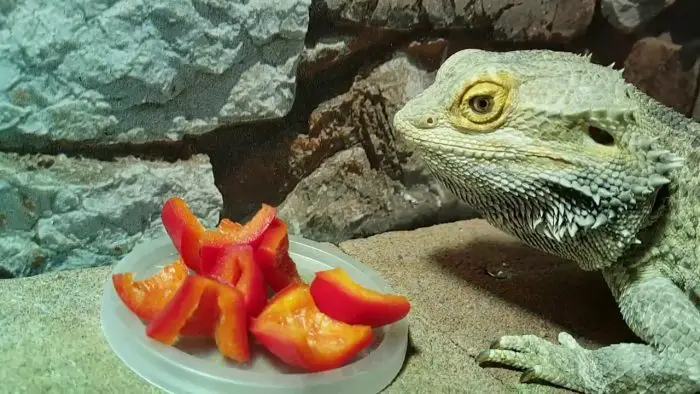
Discover the truth about Can Bearded Dragons Eat Bell Peppers. Uncover the nutritional benefits, potential risks, and expert recommendations on incorporating this vibrant vegetable into your scaly friend’s balanced and nutritious diet. Ensure their well-being with the right food choices!
Nutritional Value of Bell Peppers
Bell peppers, also known as sweet peppers or capsicum, come in various vibrant colors, including green, red, yellow, and orange. These vegetables are low in calories and rich in essential nutrients. Bell peppers are an excellent source of vitamins C, A, B6, folate, and dietary fiber. They also contain antioxidants that promote overall health and well-being.
Can Bearded Dragons Eat Bell Peppers?
Yes, bearded dragons can eat bell peppers in moderation. However, it is important to note that their diet should primarily consist of insects and leafy greens. Bell peppers should be considered as an occasional treat and not a staple food for these reptiles. Their diet should mimic their natural diet in the wild, which mainly consists of insects, greens, and some fruits.
 Can Bearded Dragons Eat Bell Peppers
Can Bearded Dragons Eat Bell Peppers
Benefits of Feeding Bell Peppers to Bearded Dragons
Feeding bell peppers to your bearded dragon can offer several benefits. Here are some reasons why you might consider including bell peppers in their diet:
Vitamin Boost: Bell peppers are rich in vitamin C, which plays a vital role in supporting the immune system of bearded dragons. Vitamin C helps in combating diseases and promotes a healthy immune response.
Hydration: Bell peppers have high water content, which can contribute to keeping your bearded dragon hydrated, especially during warmer months. Adequate hydration is crucial for their overall health and well-being.
Variety and Enrichment: Introducing different vegetables, such as bell peppers, add variety to your bearded dragon’s diet, preventing boredom and encouraging them to eat a wide range of nutritious foods.
Risks and Precautions
While bell peppers can be a healthy addition to your bearded dragon’s diet, there are a few risks and precautions to consider:
Oxalates: Bell peppers contain oxalates, which, when consumed in excess, can inhibit the absorption of calcium. Bearded dragons require calcium for proper bone growth and overall health. It is important to balance the intake of high-oxalate vegetables like bell peppers with calcium-rich foods.
Moderation: As mentioned earlier, bell peppers should be given as an occasional treat rather than a staple food. Excessive consumption of bell peppers can lead to digestive issues in bearded dragons.
 Can Bearded Dragons Eat Bell Peppers
Can Bearded Dragons Eat Bell Peppers
How to Prepare Bell Peppers for Bearded Dragons
Choose Fresh and Organic: Select fresh, organic bell peppers that are free from pesticides and other harmful chemicals. This ensures that your bearded dragon receives the highest quality and safest produce.
Wash and Remove Seeds: Thoroughly wash the bell peppers under running water to remove any dirt or contaminants. Cut the bell peppers open and remove the seeds and membranes, as they can be difficult for bearded dragons to digest.
Slice into Bite-Sized Pieces: Cut the bell peppers into small, bite-sized pieces that are easy for your bearded dragon to consume. Remember to remove any tough or chewy parts to prevent choking hazards.
Offer as a Supplement: Offer the prepared bell peppers as a supplement to your bearded dragon’s main diet, which should primarily consist of insects and leafy greens. Aim to provide them once or twice a week to maintain a balanced nutritional intake.
Other Vegetables Suitable for Bearded Dragons
In addition to bell peppers, there are several other vegetables that can be included in a bearded dragon’s diet. Here are some examples:
- Leafy Greens: Collard greens, mustard greens, dandelion greens, and kale are excellent sources of essential vitamins and minerals for bearded dragons.
- Squash: Butternut squash and zucchini are nutrient-rich vegetables that can be cooked and offered as occasional treats.
- Carrots: Carrots are high in beta-carotene and can be grated or cooked before serving to your bearded dragon.
Remember to research and ensure that any vegetables you offer are safe and suitable for bearded dragons. Avoid feeding them toxic or harmful plants.
 Can Bearded Dragons Eat Bell Peppers
Can Bearded Dragons Eat Bell Peppers
FAQs (Can Bearded Dragons Eat Bell Peppers)
Removing the seeds from bell peppers before feeding them to your bearded dragon is best. The sources can be challenging to digest and may cause digestive issues.
Bell peppers should be given as an occasional treat, around once or twice a week. They should not be the main component of their diet.
Yes, all colors of bell peppers, including green, red, yellow, and orange, are safe for bearded dragons to consume.
It is generally recommended to introduce bell peppers to baby bearded dragons after they reach a specific size and age, as their nutritional needs may differ.
No, spicy peppers should be avoided as they can cause digestive discomfort and may be harmful to bearded dragons.
Conclusion
In conclusion, bearded dragons can eat bell peppers as an occasional treat. These colorful vegetables provide a vitamin boost, hydration, and variety to their diet. However, moderation is key, as excessive consumption can lead to digestive issues. Remember to prepare the bell peppers properly by washing, removing seeds, and offering them in bite-sized pieces. Additionally, ensure a balanced diet by incorporating a variety of vegetables, leafy greens, and insects into their meals. By providing a nutritious and well-rounded diet, you can support the health and well-being of your bearded dragon.
